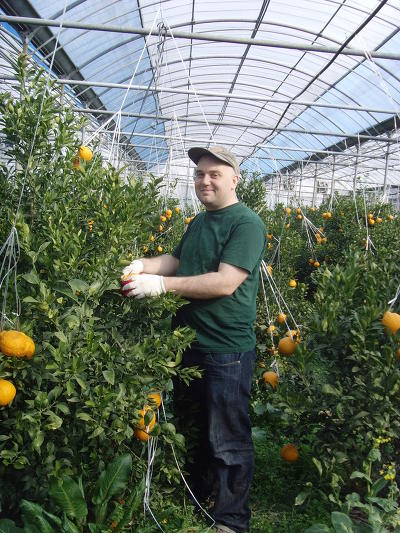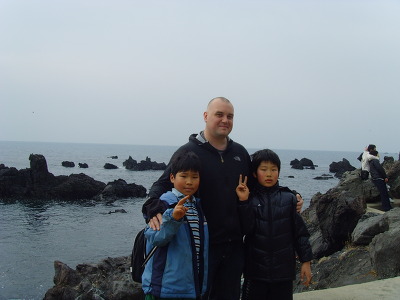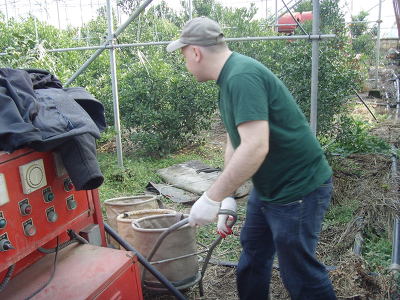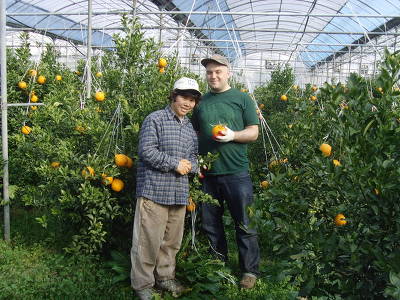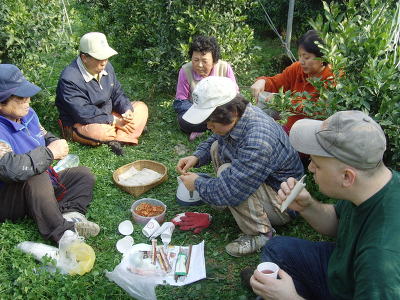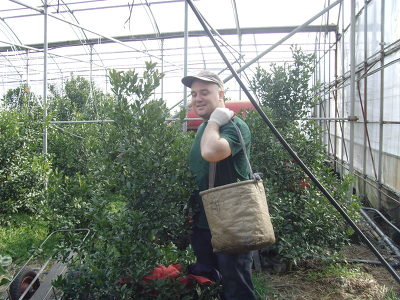Matthew forwarded the e-mail that he wrote to Mr. Paddy, a journalist of the Korea Herald regarding a few questions about his wwoofing experience in Korea.
Hello Paddy,
I am happy to help you with your article. My wwoof experience is currently ongoing, so it seems a bit premature to look back, but I will do my best. I am currently residing at Seoul farm in Shinrye-ri, seogwipo si on Jeju island. My generous hosts are the Oh family.
I have been here for about one week and plan to stay for another week or two. Previously I was at Seonam farm, near Hannam ri also in Seogwipo si with the Kim family. Perhaps I should start at the beginning and answer your questions in order.
1.Where did i work?
I knew right away that i wanted to go to Jeju island. Everything that i read about this place interested me very much. As far as the specifics, i left that up to the wwoof office. They placed me first at a tangerine and hallabong farm near Seogwipo city.
2.What was it like there?
My first host, Mr. Kim, was a very nice gentleman who went to great lengths to make me feel at home. The language barrier was daunting at first as my korean was limited to hello/goodbye, please/thank you and not much else. Mr. Kim spoke some English, but much of our communication was accomplished nonverbally and through cell phone translation.
I was surprised that it snowed the day i arrived, but the weather got much better. I stayed in a bungalow on the farm. Mr. Kim would bring me a pot of food everyday to heat up and i usually had rice, eggs, and kimchi for breakfast. The food was delicious and abundant. I ate and ate and i still got the impression that they thought i didn't like it, but i can't take down a whole pot of chige by myself! The bungalow was very comfortable and spacious with the only downside being that it got a bit a lonely sometimes, but such is the fate of the solitary traveler.
I was surprised at how many off days i was given, since i had expected to work a few hours everyday, but presumably there is less to be done in winter. When we did work, we worked hard, which i liked, because i like to earn my way and wanted to be helpful. The first work day involved weeding in the hallabong greenhouses and gathering and burning old pine needles.
Mr. Kim fed the weeds to a flock of geese he kept on the farm. I worked alongside Mr. Kim and his wife and sometimes their sons, one of whom was on break from the military, the other on break from the university. At first, i had some trouble discerning which plants constituted weeds, but i learned by watching and imitating. Most of the time we worked in storehouses, taking wooden crates full of tangerines and transfering them to plastic crates
while removing the rotten ones. Then we pulled carts of the plastic crates to the roadside and loaded them onto trucks.
At the end of a workday i was good and sore and slept better than i have in years. The Kim family was really kind to me and showed me around seogwipo. They made me feel welcome like an old friend coming to visit, not a stranger they had just met off of the internet. I feel very fortunate to have had my first wwoofing experience with them. On the last day, we did some light work around the farm and then had a barbecue of duck, black pork, and a bit of soju. It was alot of fun. I was sad to go, but excited about meeting my next host family.
I am currently staying with the Oh family in nearby Shinrye-ri. Their tangerine farm is a beautiful piece of land on a hillside overlooking the sea. The work here has been similar. Working with Mr. and Mrs. Oh, we box up tangerines and deliver them in the pickup truck to a shipping facility. Afterwards we go to a storehouse and transfer the tangerines from wooden crates to plastic containers. Then we load up the truck and take the tangerines to a processing facility. Tomorrow we will begin harvesting the hallabongs.
The Oh's have two sons, Dong Bum,14, and Dong Han,12. I have enjoyed spending time with the boys on several outings. Together we have gone to Manjangul cave, the Yeonmori Coast, and walked a section of the Olle trail. Dong Bum speaks excellent English for his age and has served as my translator. I help him with his English homework and he is teaching me some basic Korean. Living with a family is very different from living in a bungalow.
The house is very small and somewhat lacking in modern amenities(the restroom is outside the house and the "shower" consists of pouring bowls of hot water over your head) but that is more than compensated by living amongst some of the warmest and most cheerful people i have ever met. They are always laughing and smiling and living amongst this family is a real treat.
3. How did I find out about Wwoofing in Korea?
I would be remiss to explain my experience wwoofing without saying a few things about my grandfather. I first came to Korea in November of 2008 with my grandfather who was in the late stages of cancer. The doctors in America had given up on his case, so we came to Korea for experimental stem cell therapy. I was immediately taken with Korea. The people were very nice and I loved the food. We stayed for two months. Towards the end,I began conspiring to stay in Korea. I never finished my degree, so looking for work as an English teacher was a dead end.
While searching the Internet I stumbled across wwoof. This seemed like the perfect situation. I love to travel, but I hate going to a country for a week and trying to cram too many experiences into a short window of time. I enjoyed my time in Seoul, but in many ways, cities are cities the world over. I wanted to experience the "real" Korea. I wanted to go to the countryside and experience a simpler way of life through the prism of a different culture. Wwoof seemed like an excellent way to do this, particularly for a man of humble means such as myself.
My grandfather passed away this August. Although the circumstances were difficult, I really treasured our time in Korea. Spending two months in a small hotel room together, we grew very close. For this reason Korea holds a special place in my heart. I got my love of travel from my Grandfather. He was an agricultural and environmental scientist for West Virginia University and the U.S. government. He traveled around the world lecturing and consequently introduced me to many different cultures at a young age. Coming back to Korea and workning on farms seemed like a fitting pursuit.
4. Would you recommend it for other foreigners?
I would most definitely recommend this experience, but it's not for everyone. Cultural exchange is a great thing because it allows one to see that some things are done very differently than in our home countries, but in the end we are all human beings and i believe much more alike than different. That being said, some people long for city life and can't do without amenities like telephone and internet, both of which i lacked at Seonam farm. Then again, would such people even consider being wwofers?
5. What were a couple of the main things you got out of it?
While i have learned some about farming, the best thing about the experience is the people that i have met. This experience fosters strong bonds in a short period of time. When i come back to Jeju, i know that i will be amongst friends. The Kims and the Ohs have a standing offer to come and stay with me in America, and i truly hope they will take me up on this offer. When i told Mrs. Oh this, we did a "pinky swear"! I also have learned some Korean and have experienced a beautiful land from the inside out.
6. Do you think it was a valuable experience? Why?
Anyone can visit a foreign land, see the sights, take lots of pictures. But in the end, what are they left with? A few memories, a couple good meals, lots of pictures. These things can't compare to making real connections with people. Chun chun ni. Again and again i have heard these words. Slowly. Eat slowly. Walk slowly. Work slowly. Enjoy yourself. Live in the moment. Chun chun ni. And that has made all the difference.
Sincerely,
Matthew Bennett
